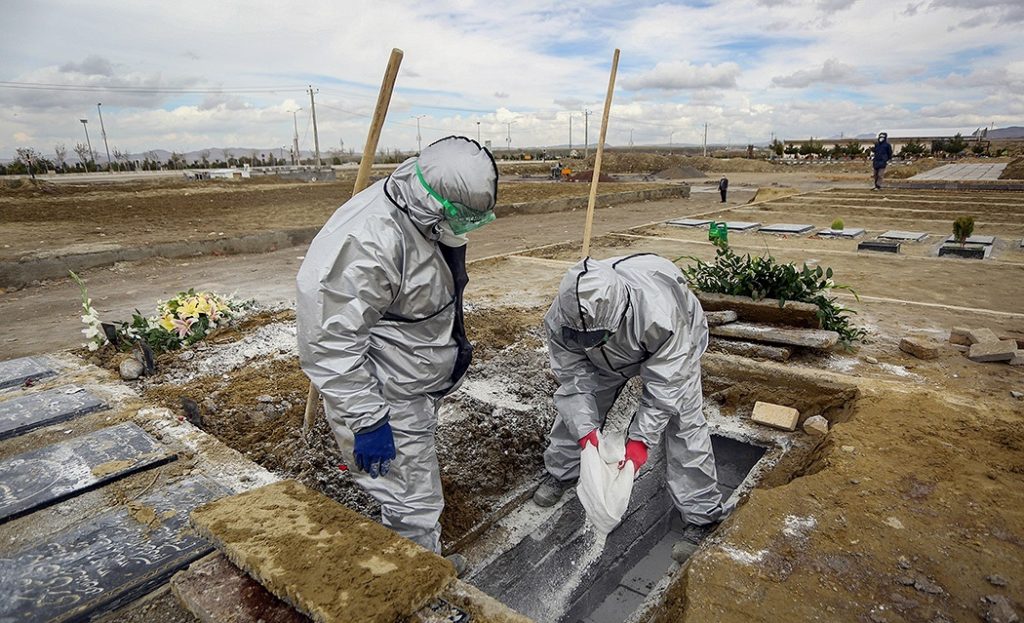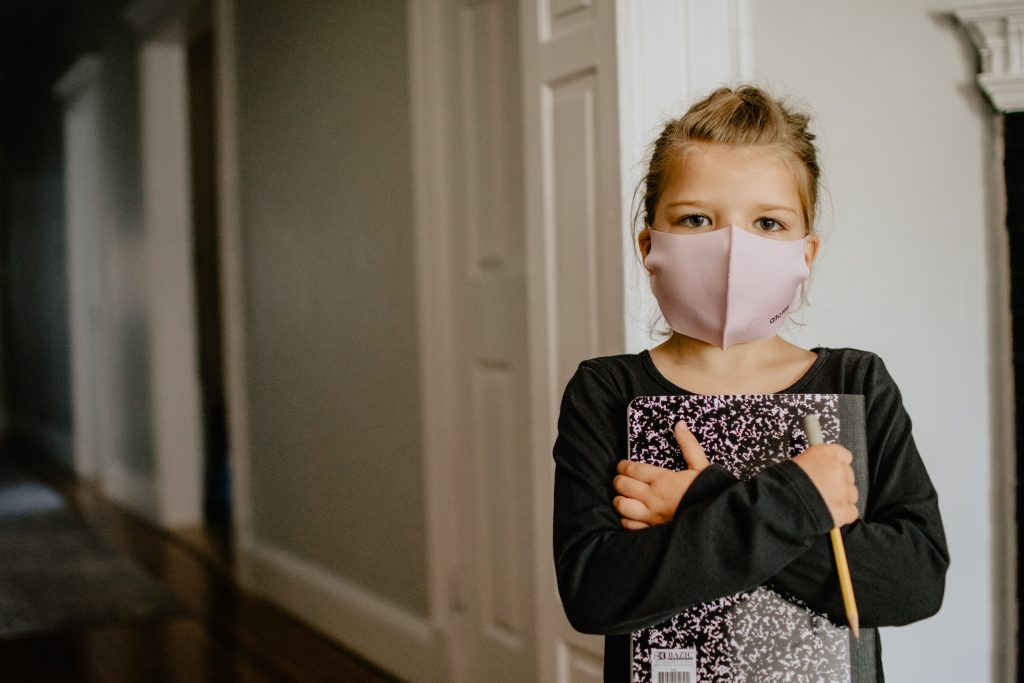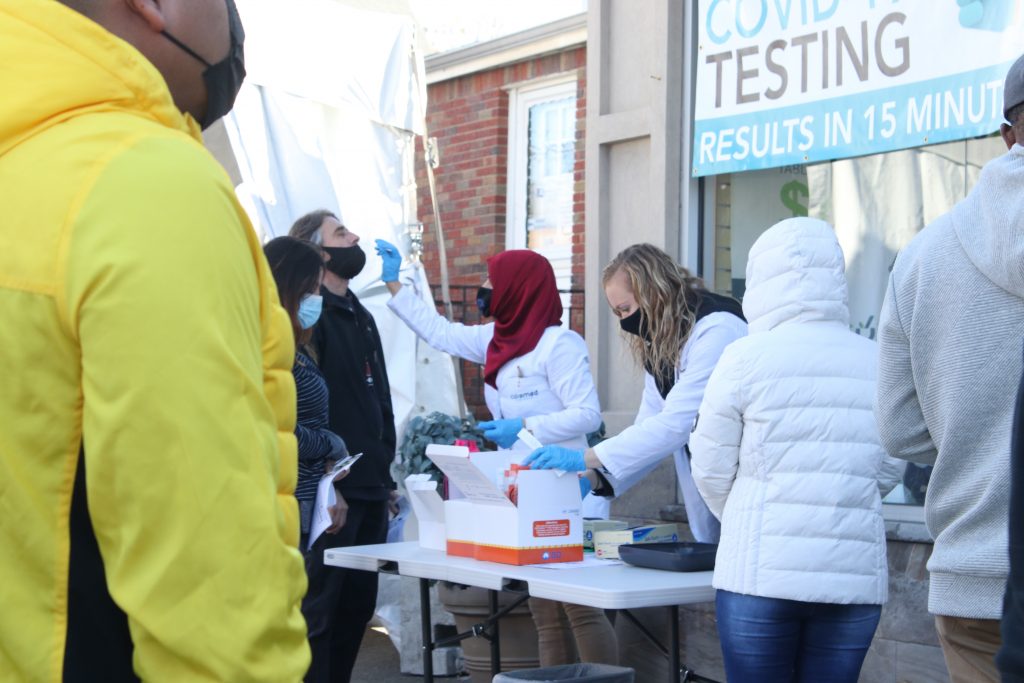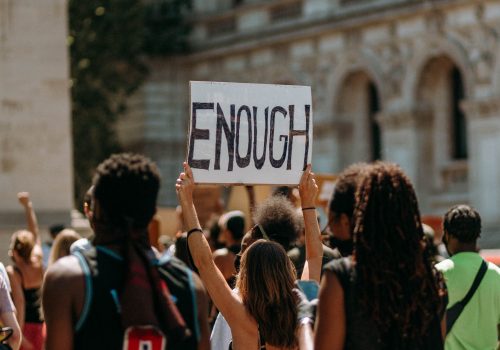Reimagining a just society pt. 2 | The end of an era
This blog post series will explore the meaning of a “just society” through multiple lenses and in the context of today’s challenges, including but not limited to the coronavirus pandemic. With contributions from multiple authors, it aims to stimulate thinking and questions that distill the prerequisites and responsibilities for “just societies” in our times.
COVID-19 spotlights the need for people everywhere to insist on collective action to create a better future. Specifically, the impacts of COVID-19 so far underscore the need for bold new policies grounded in novel thinking better matched to the enduring twin challenges of pandemics and climate change. The COVID-19 disease has hit the most neglected communities worldwide the hardest, as disasters tend to do. As the virus causes death, destruction, and tragedy around the world, human society has gained a sort of pandemic intelligence dashboard about the hot spots of modernity’s failures. In many ways, the pandemic offers us a chance to learn and test new responses to the ever-more challenging future disasters that are inevitably bearing down upon mankind in the 21st century.
Amid a contracting global economy, fraying international ties, and the urgency of discovering a medical solution, it’s easy to miss how the ongoing catastrophe has marked the end of an era.

The COVID-19 pandemic has unleashed a socioeconomic cataclysm that compels us to reimagine our modern world. Other than the 1918 global flu pandemic, there is little modern historical precedent comparable to this disaster. Some past catastrophes have catalyzed new thinking about mankind’s understanding of its place in the universe, and the scale of this current crisis should make its implications for the concepts of peace, prosperity, justice, and security hard to ignore. In a rational world prioritizing human survival and well-being, the zoonotic origins of the virus imply the need for such new thinking. Evolving theories about a “just society” in a rapidly changing world can act as vectors to spur new action and inform necessary reforms. “Lessons learned,” alternatively, can be and often are ignored (perhaps even relegated to a forgotten stack of documents in a back office), leading to greater disasters in the future; public health experts note that it is this past cycle of concern and inaction that has worsened the effects of the COVID-19 pandemic.
Prevailing concepts of peace, prosperity, justice, and security are rooted in a now-defunct epoch of relative environmental stability. In the past, plagues occurred, wars were fought, and peaces negotiated, but the climate at least was relatively stable. By contrast, our times are increasingly characterized by weather extremes that are a product of a radically changing climate and environmental degradations such as deforestation. The mid-twentieth century origins of many modern geopolitical, economic, and international security and human rights conventions mean that they did not anticipate these global challenges and their impacts on human society. A particular mismatch involves intensifying and more frequent incidents of wildfires, droughts and floods, as well as the growing risks of recurrent pandemics — both phenomena stemming from the accumulated impacts of human activities on natural habitats.
While far from the first instance of zoonotic disease transmission to humans, the novel coronavirus is the first to shut down modern global society and actively harm billions of people’s prospects for survival and economic opportunity. Its origins in the nexus of human and wildlife activities tell us that that this economically destructive pandemic won’t be the last.
“There is no health security without social security”
A World in Disorder. Global Preparedness Monitoring Board Annual Report 2020.
Few foresaw that a novel coronavirus would expose the vulnerability of modern society, the global economy, and national and international security. Expert-level commissions warned of the need for improved international pre-pandemic crisis preparedness, but the rapid unfolding of this disaster exceeded most worst-case concerns. “COVID-19 has taken advantage of a world in disorder,” according to the World Health Organization’s Global Preparedness Monitoring Board. Deeply entrenched systemic racism, economic inequality, international distrust, and inadequate societal preparedness have amplified the pandemic’s devastation. “We have created a world where a shock anywhere can become a catastrophe everywhere, while growing nationalism and populism undermine our shared peace, prosperity and security,” according to the WHO. The same advances that have improved quality of life around the world have created “unprecedented vulnerability to fast moving infectious disease outbreaks by fueling population growth and mobility, disorienting the climate, boosting interdependence, and generating inequality.”
“We have created a world where a shock anywhere can become a catastrophe everywhere, while growing nationalism and populism undermine our shared peace, prosperity and security”
A WORLD IN DISORDER. GLOBAL PREPAREDNESS MONITORING BOARD ANNUAL REPORT 2020.
More people now understand that recurrent pandemics, intensified by the increasingly destructive effects of climate change and economic inequality, are inevitable without sweeping changes in human society and its behaviors. Yet, amid a contracting global economy, fraying international ties, and the urgency of discovering a medical solution, it’s easy to miss how the ongoing catastrophe has marked the end of an era.
Humanity itself will be redefined in the coming epoch largely because the pandemic’s socioeconomic and health effects, while unevenly distributed, have touched everyone. The pandemic has widened global fissures between the haves and the have-nots. Those with means have been able to work from home, where they are safer, while many others working in healthcare, food processing facilities, and schools are forced to choose between keeping their jobs and protecting their health.

Children in particular are affected with schools generally closed for in-person learning in many countries while, in others, there is also a rising incidence of child marriages. Everywhere, for those without access to the Internet, who live in crowded spaces, or were homeless to begin with, keeping up with their education may be impossible.
The future course of global society is not predetermined, but it assuredly will be affected by the pandemic’s toll. Imaginable scenarios include a more dystopian world that, while dominated by artificial intelligence, ubiquitous surveillance, and disinformation, is composed of more impoverished people without basic democratic freedoms or access to affordable healthcare, education, or economic opportunity. Alternatively, the COVID-19 disaster could foster greater awareness of the interdependence of nations with the natural environment within an infinite array of possible scenarios.
Who is responsible?
Can there be a “just society” without someone or something to take responsibility for preventable human loss of life and opportunity? Even though the novel virus itself is not man-made, the underlying conditions of economic activities and inadequate societal preparations have left billions in harm’s way.
Yet, questions of society’s accountability generally go unasked. The sources of such collective responsibility are unclear, as is the method of engaging all the affected parties on so broad a topic. After all, who or what is responsible for the current cataclysm? And who is responsible for imagining ways to build upon the catastrophe’s lessons for a better future? A recent report from the Council on Foreign Relations notes that “Pandemic threats are inevitable, but the systemic U.S. and global policy failures that have accompanied the spread of this coronavirus were not.” Will new US and global policies integrate the realities of a permanently altered and more disruptive environmental context in efforts to address inequities that worsen the effects of the current pandemic?
Notions of justice, peace, prosperity, and a “just society” will need updating to avoid still worse catastrophes. In an era of global challenges rooted in collective action failures, moreover, what will be the costs of not anticipating massive migration flows exacerbated by a changing climate? What is the cost to ordinary citizens of retrenchment by individual nations, including the United States, from the type of multilateral engagement, trust-building, and burden-sharing that can best prevent such epic disaster? It is clear that the answers to these questions of accountability will not be found on the usual profit-and-loss ledgers.

As the COVID-19 death toll continues to grow, questions persist that even the most sophisticated artificial intelligence cannot answer. Does it matter whether preventable human deaths occur not as a direct result of actions by common criminals or at the direct behest of a criminal regime but instead indirectly result from socio-economic causes, racial discrimination, contempt of science and scientists, and inadequate global crisis coordination? Some say, “It is what it is,” while others say, “It didn’t have to be this way.” This age-old contest over the extent of humankind’s responsibilities for its actions and decisions has been thrown into stark relief in 2020. The only certainty is that decisions we take today will tip the scales in one way or the other on the inevitability and societal acceptability of preventable human tragedy. In the coming era, our responses to the condition of humanity around the world will define what it means to be human.
Previous installment:

The GeoTech Center champions positive paths forward that societies can pursue to ensure new technologies and data empower people, prosperity, and peace.
